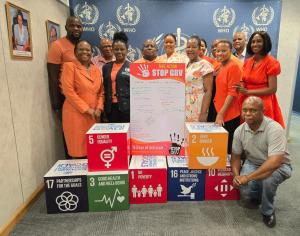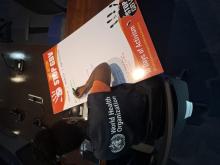WHO Botswana Hosts 16 Days of Activism Campaign
In honor of the 16 Days of Activism Against Gender-Based Violence-GBV, the WHO Botswana Country Office hosted a campaign featuring a video screening and discussion on GBV. A survivor shared a powerful story, highlighting key takeaways and exploring how WHO can contribute to ending GBV. Additionally, a pledge wall was set up for staff to write and share their commitments to addressing this issue. This year’s theme, ‘Towards Beijing +30: UNiTE to End Violence Against Women and Girls,’ underscores the importance of collective action in building a violence-free future.
Addressing the staff, WHO Officer in Charge, Dr. Juliet Bataringaya, condemned GBV as a violation of human rights that strips victims of their dignity. She emphasized that GBV affects everyone, directly or indirectly, as survivors are often close relatives or members of our communities. “We cannot separate ourselves from the impacts of GBV,” she said. Dr. Bataringaya highlighted the role of upbringing in contributing to GBV by shaping beliefs, attitudes, and behaviors that may perpetuate or normalize violence. She noted that some parenting practices, such as excessive pampering or lack of discipline, can influence children’s behavior. “When children grow up in abusive environments, they often emulate such lifestyles and adopt similar tendencies or behaviors,” she added. However, she stressed that it is never too late for parents to instill good values, attitudes, and skills in their children to promote respect, equality, and non-violence. Dr. Bataringaya advocated for blending traditional child-rearing practices with contemporary insights to provide a balanced upbringing that respects cultural heritage while preparing children for modern challenges.
During the discussion, participants agreed that cultural norms and socialization contribute to GBV by reinforcing unequal power dynamics, rigid gender roles, and tolerance for violence. Socialization processes often teach boys to value dominance and control while encouraging girls to be submissive, perpetuating harmful stereotypes that normalize male authority and female subordination. It was also noted that GBV occurs across all cultures, age groups, and dress codes, highlighting that violence is rooted in power dynamics, control, and societal norms, not in how someone dresses. Participants called for stricter laws to hold GBV perpetrators accountable and foster a safer, more equitable society.






